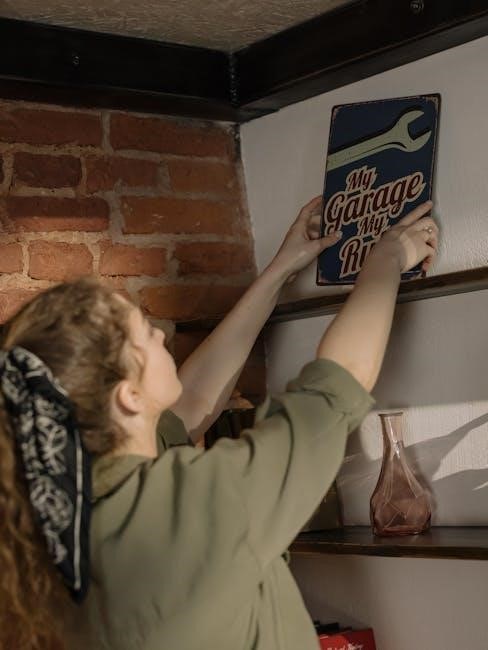Establishing clear house rules is essential for fostering harmony and preventing conflicts among roommates. A written agreement ensures mutual understanding and provides a framework for shared responsibilities.
1.1 Importance of Establishing Clear House Rules
Clear house rules are vital for maintaining harmony and preventing conflicts among roommates. They provide a structured framework for shared responsibilities, ensuring fairness and accountability. By outlining expectations early, roommates can avoid misunderstandings and foster a respectful living environment. Written agreements also serve as a reference point for resolving disputes, reducing tension and promoting open communication. Establishing rules helps protect individual rights while fostering a sense of community, making shared living spaces more enjoyable and sustainable; A well-defined set of rules ensures that everyone contributes equally, creating a balanced and organized home life.
1.2 Benefits of a Written Roommate Agreement
A written roommate agreement provides clarity and structure, ensuring all parties understand their roles and responsibilities. It helps prevent conflicts by addressing financial obligations, chore distribution, and personal boundaries upfront. Having a formal document encourages open communication and accountability, reducing the likelihood of disputes. It also serves as a legal safeguard, protecting roommates from potential issues like unpaid rent or damages. By outlining expectations clearly, a written agreement fosters mutual respect and creates a more harmonious living environment. This document is a valuable tool for maintaining peace and organization in shared spaces, ensuring a smooth and stress-free cohabitation experience.

Key Components of House Rules
House rules typically cover financial responsibilities, chore distribution, quiet hours, and guest policies to ensure a harmonious and organized living environment for all roommates.
2.1 Financial Responsibilities and Expenses
Financial responsibilities are a cornerstone of house rules, ensuring fairness and transparency. Roommates should agree on splitting utilities, rent, and shared expenses like groceries or cleaning supplies.
Clarifying payment methods and due dates helps avoid disputes. It’s important to establish a system for tracking contributions and addressing any discrepancies.
Regular budget reviews can prevent misunderstandings and ensure everyone’s financial obligations are met. A clear financial plan fosters trust and stability in the living arrangement.

2.2 Chore Distribution and Cleaning Schedules
A fair and organized approach to chores is vital for maintaining a clean and comfortable living environment. Roommates should create a shared schedule outlining responsibilities for cleaning, trash disposal, and maintaining common areas.
Chores can be divided equally or based on preferences and schedules to ensure accountability. Regular cleaning tasks, such as wiping surfaces or vacuuming, should be assigned with clear deadlines.
Establishing a rotation system can prevent boredom and ensure fairness. Open communication about cleanliness expectations and consequences for neglected tasks helps maintain harmony. A well-planned chore system fosters mutual respect and reduces conflicts.
2.3 Quiet Hours and Noise Levels
Establishing quiet hours and noise level guidelines is crucial for maintaining a peaceful living environment. Roommates should agree on specific times when noise levels must be minimized, such as late evenings or early mornings.
These rules help ensure everyone can rest, study, or relax without disturbances. It’s important to discuss and define acceptable noise levels for shared spaces, including limits on music, gatherings, or loud conversations.
By setting clear expectations, roommates can respect each other’s need for quiet time, fostering a harmonious and considerate living atmosphere. Including these guidelines in the agreement ensures accountability and prevents potential conflicts.
2.4 Guest Policies and Overnight Stays
Establishing guest policies and rules for overnight stays is vital to maintain privacy and comfort in shared living spaces. Roommates should agree on the frequency and duration of guest visits, ensuring they don’t disrupt daily routines.
It’s important to set boundaries, such as requiring prior approval for overnight guests or limiting the number of consecutive nights a guest can stay. Additionally, guests should be expected to respect house rules, including noise levels and cleaning responsibilities. Clearly defining these expectations helps prevent conflicts and ensures all roommates feel comfortable in their home. Including these guidelines in the agreement promotes accountability and mutual respect.

Creating a Roommate Agreement
A roommate agreement is a vital document outlining shared responsibilities, financial obligations, and house rules. It serves as a reference for resolving disputes and ensuring harmony.
3.1 Template for a Roommate Agreement

A roommate agreement template outlines the framework for shared living, covering financial responsibilities, chore distribution, quiet hours, and guest policies. It typically includes sections for rent, utilities, and expenses, as well as rules for common spaces and personal belongings. The template should also address conflict resolution methods and the consequences of violating the agreement. Including a section for signatures ensures mutual accountability. Customizable templates are widely available online, allowing roommates to tailor the document to their specific needs. This tool promotes clarity and harmony, helping roommates establish a fair and respectful living environment from the start.
3.2 What to Include in the Agreement
A roommate agreement should include clear guidelines on financial responsibilities, such as rent, utilities, and shared expenses. Chore distribution and cleaning schedules ensure fairness and maintain a clean living space. Quiet hours and noise levels should be defined to respect everyone’s lifestyle. Guest policies, including overnight stays, should be outlined to prevent conflicts. Lifestyle considerations like smoking, substance use, and food sharing should be addressed. Pet policies, if applicable, must clarify responsibilities. Legal aspects, such as lease terms and safety standards, should also be covered. Including these elements ensures transparency and mutual respect, creating a harmonious living environment.
3.3 Significance of a Signed Document
A signed roommate agreement ensures commitment and clarity, reducing potential conflicts. It serves as a legally binding document, providing accountability and a clear reference for resolving disputes. By signing, roommates demonstrate mutual respect and understanding of the agreed-upon terms. This formalizes responsibilities and expectations, creating a fair and organized living environment. A signed document also offers peace of mind, as it outlines consequences for violations and ensures all parties are held to the same standards. Ultimately, it fosters trust and cooperation, making shared living spaces more harmonious and sustainable.

Lifestyle Considerations
Lifestyle considerations include smoking policies, substance use, food sharing, and pet responsibilities. These rules ensure compatibility and respect among roommates, fostering a harmonious living environment.
4.1 Smoking and Substance Use Policies
Smoking and substance use policies are crucial for maintaining a safe and healthy living environment. Many roommate agreements prohibit smoking inside shared spaces to prevent damage and health risks. Designated outdoor areas may be allowed for smoking, provided roommates agree. Substance use should be addressed clearly, ensuring it does not disrupt others or violate local laws. Open communication about preferences and boundaries is essential to avoid conflicts. These policies should be outlined in writing to ensure mutual understanding and respect for all roommates’ lifestyles and well-being. Enforcement of these rules helps maintain harmony and accountability within the household.
4.2 Food Sharing and Kitchen Etiquette
Food sharing and kitchen etiquette are vital for maintaining a harmonious living environment. Labeling personal food items and respecting shared spaces helps prevent conflicts. Roommates should agree on what is communal and what is off-limits. Cleaning up after cooking and washing dishes promptly fosters a clean and comfortable kitchen. Shared expenses for staples like condiments or cleaning supplies should be discussed. Additionally, respecting dietary preferences and avoiding strong-smelling foods can enhance mutual respect. A schedule for fridge cleanup and trash disposal ensures the space remains hygienic. Clear communication about kitchen use and shared food items is key to avoiding misunderstandings and maintaining a positive atmosphere.
4.3 Pet Policies and Responsibilities
When roommates have pets, establishing clear pet policies is essential to maintain a harmonious living environment. Agreements should include rules about allowed breeds, sizes, and the number of pets. Responsibilities like feeding, grooming, and waste cleanup should be shared or assigned. Noise levels and potential damage to property must be addressed. Regular veterinary visits and up-to-date vaccinations are crucial for health safety. Additionally, roommates should discuss allergies or phobias and ensure pets do not disrupt shared spaces. Financial responsibilities for pet-related damages or additional cleaning costs should be outlined. A written agreement ensures mutual understanding and prevents conflicts, fostering a respectful and pet-friendly home environment.

Conflict Resolution
Conflict resolution involves addressing disputes through open communication and mediation. A neutral third party can help roommates reach mutually acceptable solutions, ensuring harmony and respecting shared agreements.
5.1 Communication Strategies for Roommates
Effective communication is vital for resolving conflicts and maintaining a harmonious living environment. Open and honest dialogue ensures that concerns are addressed promptly. Roommates should express their needs clearly and listen actively to one another, fostering mutual respect. Regular meetings can help prevent misunderstandings by providing a platform for discussing issues. Using “I” statements instead of “you” statements reduces defensiveness and promotes constructive conversations. Agreeing on a communication approach upfront, such as weekly check-ins, can help address problems before they escalate. By prioritizing understanding and empathy, roommates can navigate disagreements with ease and maintain a positive relationship.
5.2 Mediation and Dispute Resolution Techniques
Mediation is a powerful tool for resolving roommate disputes amicably. Neutral third parties, like mutual friends or professional mediators, can facilitate open discussions. Active listening and remaining calm are crucial during mediations. Roommates should focus on finding mutually acceptable solutions rather than “winning” arguments. Structured processes, such as outlining issues and proposing compromises, can guide productive conversations. Documenting agreements post-mediation ensures clarity and accountability. Regular check-ins can also prevent future conflicts by addressing concerns early. By fostering a culture of understanding and respect, roommates can resolve disagreements effectively and maintain a harmonious living environment.

Legal and Safety Considerations
Understanding lease agreements and local laws is crucial. Roommates must adhere to safety standards, report hazards, and follow emergency procedures to ensure a secure living environment.
6.1 Understanding the Lease Agreement
Understanding the lease agreement is crucial for roommates, as it outlines legal obligations and responsibilities. The lease defines rent, term, and tenant responsibilities, ensuring clarity on financial commitments and property use. Roommates should review the agreement to understand their roles and liabilities, even if they are not direct signatories. Key elements include payment terms, maintenance duties, and termination clauses. While roommates may not be on the lease, they are often bound by its terms indirectly. Familiarity with the lease helps prevent legal disputes and ensures compliance with landlord requirements. It also protects roommates by clarifying expectations and responsibilities shared among all occupants.
6.2 Safety Standards and Emergency Procedures
Establishing safety standards and emergency procedures is vital for a secure living environment. Roommates should ensure working smoke detectors, accessible fire extinguishers, and clear emergency exits. A first aid kit should be available, and all occupants must know its location. Regular fire drills and discussions about evacuation plans are recommended. Roommates should agree on protocols for power outages or natural disasters. Maintaining a list of emergency contacts, such as the landlord and local authorities, is essential. Open communication about potential hazards, like electrical issues, ensures proactive safety measures. By prioritizing safety, roommates can prevent accidents and respond effectively in emergencies, fostering a secure and prepared household environment.

Printable House Rules Template
A downloadable House Rules Template helps roommates outline responsibilities, chores, and expectations. Customize sections for chores, finances, and guest policies to suit your living situation.
7.1 Downloadable PDF Template for Roommate Rules
A downloadable PDF template simplifies creating house rules for roommates. It includes sections for financial responsibilities, chore distribution, guest policies, and noise levels. Customize the template to suit your living situation by adding specific rules or clauses. Print and sign the document with all roommates to ensure clarity and mutual agreement. This template is a practical tool for maintaining harmony and organization in shared spaces. It provides a clear framework for addressing common issues and ensures everyone understands their obligations. Downloading a pre-designed template saves time and helps roommates focus on building a positive living environment together.
7.2 Customizing the Template for Your Needs
Customizing a house rules template allows you to tailor the agreement to your specific living situation. Start by reviewing the standard sections and adding or modifying clauses to reflect your preferences. For example, you can specify quiet hours, guest policies, or shared expenses. Include details about chore distribution, food sharing, and personal space boundaries. Ensure all roommates contribute to the customization process to foster mutual agreement. You can also add legal references, such as lease terms or local regulations. This personalized approach ensures the document addresses all aspects of your shared living arrangement, making it a comprehensive guide for harmonious cohabitation.

Implementing and Enforcing House Rules
Implementing house rules requires creating a routine and ensuring accountability. Regular reminders, check-ins, and positive reinforcement can help maintain adherence. Clear consequences for violations promote fairness and responsibility.
8.1 Regular Meetings to Review Rules
Scheduling regular meetings is crucial for maintaining harmony and addressing concerns. Set a weekly or bi-weekly time to discuss rule adherence, review responsibilities, and resolve any emerging issues. These meetings ensure everyone remains on the same page and foster open communication. Use this time to assess chore distribution, financial responsibilities, and noise levels. Encourage roommates to voice concerns or suggest adjustments. Documenting key points and decisions helps track progress and accountability. Consistent check-ins prevent misunderstandings and strengthen mutual respect, fostering a harmonious living environment.
8.2 Consequences for Violating Agreements
Establishing clear consequences for violating house rules ensures accountability and maintains order. Common penalties include losing security deposits or paying fines for repeated offenses. Roommates who fail to meet financial obligations may face late fees or liability for shared expenses. Excessive noise violations could result in mediated discussions or temporary loss of privileges. Repeated disregard for agreed rules may lead to formal warnings or, in severe cases, eviction. It’s crucial to outline these consequences in the written agreement to ensure fairness and mutual respect. Consistent enforcement fosters accountability and reinforces the importance of adhering to the established guidelines for harmonious living.
Creating a harmonious living environment requires mutual respect, clear communication, and adherence to agreed house rules. Shared responsibilities ensure a peaceful and respectful home for all roommates.
9.1 The Role of Mutual Respect in Shared Living
Mutual respect is the cornerstone of a harmonious living environment. By valuing each roommate’s boundaries, opinions, and personal space, conflicts are minimized. Respect fosters open communication, ensuring concerns are addressed calmly and fairly. It promotes a positive atmosphere where everyone feels valued and comfortable. Shared spaces and belongings are treated with care, reflecting a collective commitment to maintaining a respectful home. When roommates prioritize respect, they create a foundation for understanding and cooperation, leading to a peaceful and enjoyable living experience for all. This mindset is essential for nurturing long-term, positive relationships among housemates.
9.2 Final Thoughts on Creating a Harmonious Living Environment
Creating a harmonious living environment requires effort, communication, and adaptability from all roommates. By establishing clear house rules and respecting shared spaces, conflicts can be minimized. Open dialogue and a willingness to compromise are key to maintaining peace. Shared responsibilities, such as chores and expenses, should be divided fairly to ensure equality. Regular discussions about needs and concerns can prevent misunderstandings. A harmonious home is built on mutual respect, trust, and a collective commitment to maintaining a positive atmosphere. By fostering these values, roommates can create a space where everyone feels comfortable, valued, and supported, leading to a thriving shared living experience.
